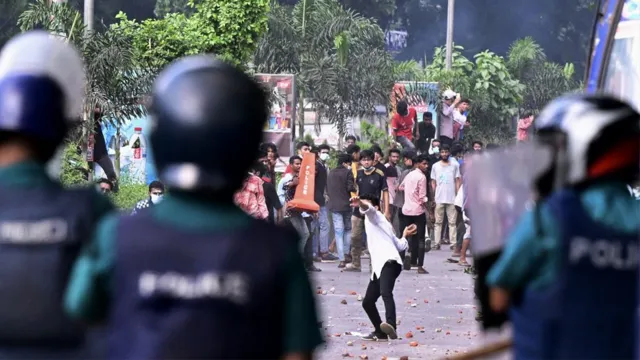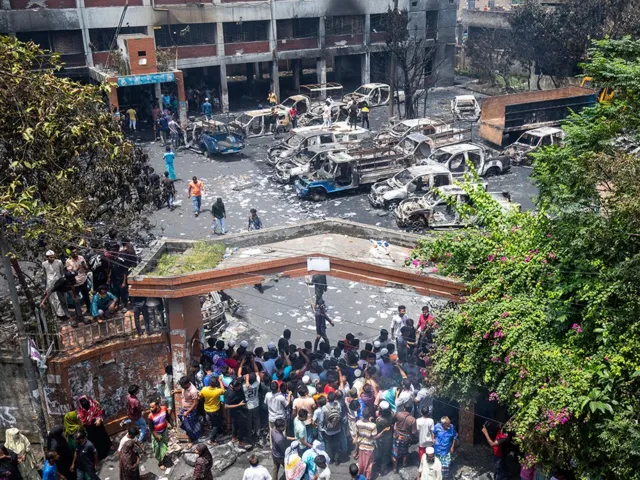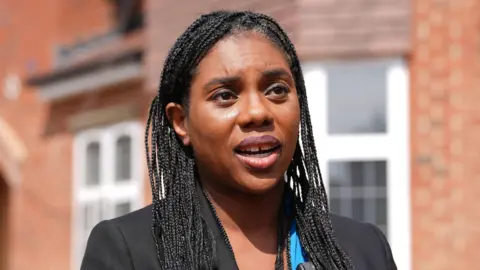Leaked Audio Suggests Former Bangladesh PM Authorized Deadly Crackdown
Leaked Audio Suggests Former Bangladesh PM Authorized Deadly Crackdown
Dhaka, Bangladesh – Leaked audio recordings, verified by BBC Eye Investigations, suggest that former Bangladeshi Prime Minister Sheikh Hasina authorized a deadly crackdown on student-led protests last year. The audio purportedly captures Hasina instructing security forces to use lethal force, stating, “wherever they find [them], they will shoot.” This revelation comes as Hasina faces trial in absentia for crimes against humanity, with prosecutors intending to use the recording as key evidence.
The unrest, which escalated into a mass movement that led to Hasina’s ouster after 15 years in power, resulted in significant violence, with UN investigators estimating that up to 1,400 people died. Hasina, who has since fled to India, and her party have vehemently denied all charges.

A spokesperson for Hasina’s Awami League party dismissed the tape, claiming it did not demonstrate any “unlawful intention” or an “disproportionate response.” However, the audio, leaked online in March, is considered by authorities to be the most substantial evidence yet of Hasina’s direct involvement in authorizing the use of lethal weapons against demonstrators.
The protests, initially sparked by opposition to affirmative action policies favoring relatives of 1971 independence war veterans in civil service jobs, transformed into a nationwide upheaval. The ensuing violence marked the most severe period of unrest in Bangladesh since the 1971 war of independence.
A critical day during the demonstrations was August 5, the day Hasina departed the capital by helicopter as protesters advanced on her Dhaka residence. The BBC World Service investigation has also brought to light previously unreported details concerning a police massacre in the capital, revealing a significantly higher death toll than initially reported.
The leaked recording, made on July 18, reportedly occurred while Hasina was at her Dhaka residence, Ganabhaban. A source familiar with the audio confirmed its authenticity to the BBC. This call took place during a period of heightened tension, as security forces were responding to widespread public anger fueled by videos of police brutality against protesters circulating on social media. Evidence, including police documents reviewed by the BBC, indicates that military-grade firearms were deployed and utilized across Dhaka in the days following this conversation.
The recording is among many calls attributed to Sheikh Hasina, monitored by the National Telecommunications Monitoring Centre (NTMC), a Bangladeshi government agency. Although the audio surfaced in early March, the source of the leak remains unknown. Numerous unverified clips of Hasina’s calls have appeared online since the protests.
Independent verification by audio forensics experts at Earshot confirmed that the recording showed no signs of editing or manipulation, and it was highly improbable that it was synthetically generated. The presence of Electric Network Frequency (ENF) throughout the recording, a common indicator of authenticity, further supports its credibility. Earshot’s analysis of Hasina’s speech patterns, including rhythm, intonation, and breath sounds, revealed consistent noise floor levels, with no evidence of artificial manipulation.
Toby Cadman, a British international human rights barrister advising Bangladesh’s International Criminal Tribunal (ICT), stated that the recordings are “critical for establishing her role, they are clear and have been properly authenticated, and are supported by other evidence.”
The Awami League spokesperson reiterated their inability to confirm the authenticity of the recording. “We cannot confirm whether the tape recording referenced by the BBC is authentic,” they stated.
The BBC investigation also shed light on the specifics of the Jatrabari police station incident on August 5, where at least 52 people were reportedly killed by police, surpassing initial reports of 30 deaths. This event is considered one of the most egregious instances of police violence in Bangladesh’s history.

Eyewitness footage, CCTV, and drone imagery analyzed by BBC Eye revealed that police initiated indiscriminate firing on protesters after army personnel, who had been separating the groups, withdrew. For over half an hour, police continued to fire on fleeing demonstrators attempting to escape through alleyways and highways. The violence saw retaliation from protesters hours later, who set fire to the Jatrabari police station, resulting in the deaths of at least six police officers.
A Bangladesh Police spokesperson acknowledged that “regrettable incidents in which certain members of the then police force engaged in excessive use of force” occurred, adding that “Bangladesh Police has launched thorough and impartial investigations.” Approximately 60 police officers were reportedly arrested for their involvement in the violence during July and August of the previous year.
Hasina’s trial commenced last month, where she faces charges including crimes against humanity, specifically issuing orders that led to mass killings, engaging in targeted violence against civilians, incitement, conspiracy, and failure to prevent mass murder. India has yet to respond to Bangladesh’s extradition request for Hasina, and her return for the trial is considered unlikely by legal experts.
The Awami League maintains that its leaders are not culpable for the force used against protesters, with a spokesperson stating, “The decisions made by senior government officials were proportionate in nature, made in good faith and intended to minimise the loss of life.” The party also disputes the findings of UN investigators regarding potential crimes against humanity.
Following Hasina’s departure from power, Bangladesh is currently governed by an interim administration led by Nobel laureate Muhammad Yunus, which is preparing for national elections. The eligibility of the Awami League to participate in these elections remains uncertain.



Post Comment